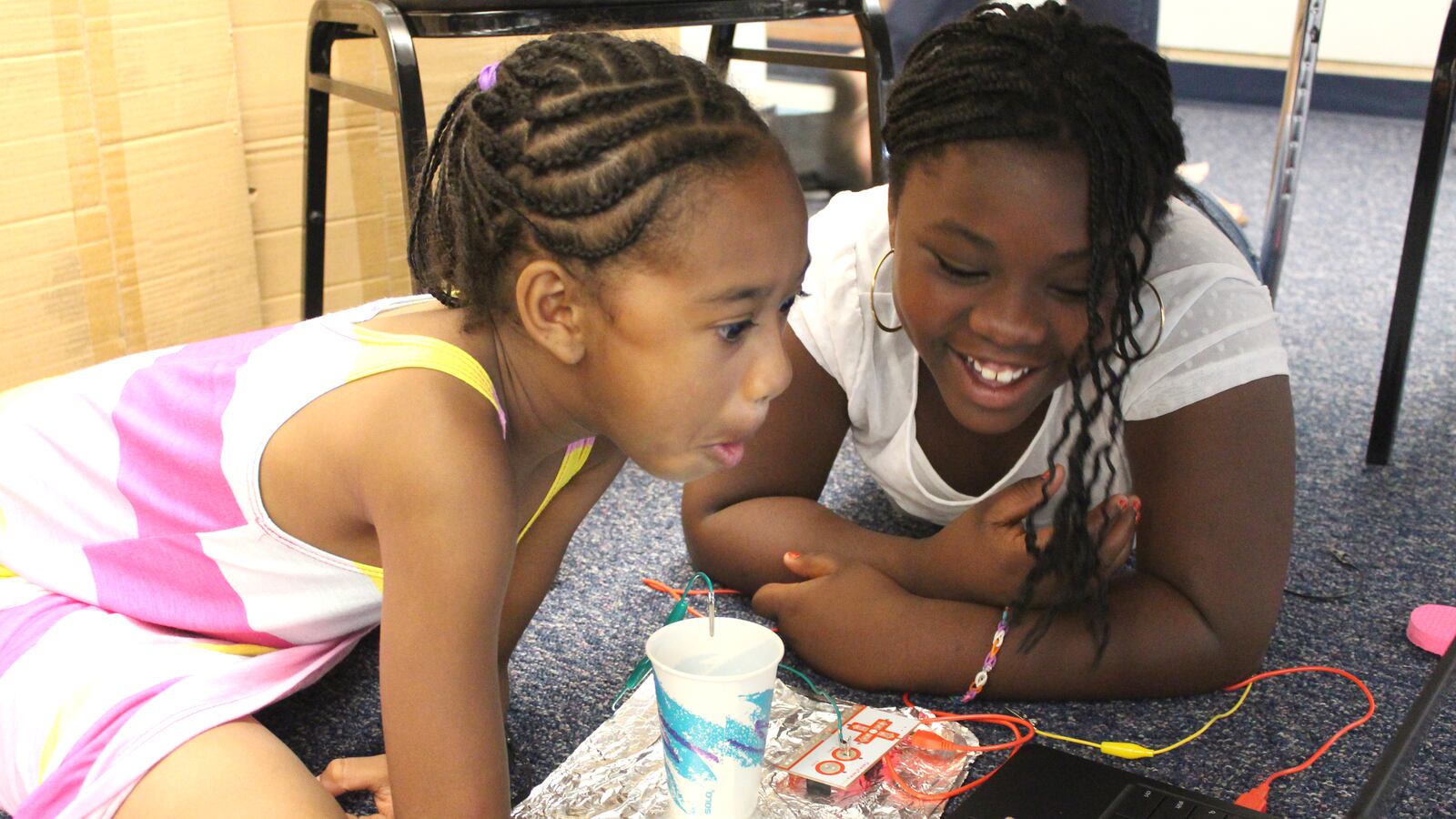On a Tuesday in June, Kayla Shaw Wilford Thomas and Maliah Thompson had found a nook under a table in a first-floor classroom at Columbine Elementary in Denver and were hard at work. Their task? To operate a photo program on a laptop computer using an electronics kit instead of the keyboard.
So far, it was a mixed success. “Why’s it taking so many pictures?” Maliah exclaimed.
But their teacher, Caitlin Caliguiri, said whether or not the program was working perfectly wasn’t the point. The goal was for the students to be exposed to new objects and ideas, and to come up with questions and solutions on their own. In the meantime, Caliguiri, who will be leading a personalized learning program at Columbine next year, was herself learning through experience about what kinds of student-led projects are most effective.
The computer experiment was part of Denver Public Schools’ Summer Lab Academies, a new three-week program designed to be a place for both students and their teachers to try new things. It’s one of a number of programs in Denver Public Schools’ “innovation lab,” known as the imaginarium, which district officials say will be a place for new ideas in education to be created, developed, tested, revised, and, if they succeed, expanded. (The district does not capitalize the “i” in promotional materials.)
As part of a restructuring this spring, DPS combined several programs into the new department, run by senior director Makisha Boothe.
Denver schools, students, and teachers apply to work with the imaginarium‘s team on an ever-growing list of projects. The current set includes a school design program focused on personalized learning, the summer lab academy, a peer-to-peer learning program for district and charter school teachers, and a competency-based arts program.
The imaginarium refers to its schools and projects as “clients” — terminology that foreshadows how more Denver Public Schools departments will interact with schools in coming years. The district’s board voted in May to allow schools to opt into district offerings instead of being automatically enrolled including professional development for teachers.
Most of the imaginarium’s current programs were initially independent initiatives funded by different philanthropies, including the Janus Foundation, the Walton Family Foundation, the Bill & Melinda Gates Foundation, and the Carnegie Foundation. (Chalkbeat also receives funding from the Walton and Gates Foundations to support its news coverage of education issues.)
Boothe, a drafter of Colorado’s Innovation Schools Act, said that while the DPS has been trying new programs and strategies aimed at improving student achievement and equity, “there was no consistent infrastructure” for evaluating which worked and expanding those that were successful.
“We wanted to bring them all together for research, development and innovation, to capture the learning, capture the failings, and to disseminate case studies and know what we should scale,” she said.
Once an idea — which might be as small as a classroom strategy or as big as a new school design — is developed, the imaginarium team runs through a series of piloting and reflection exercises. The team then presents a case to district leadership about whether that project should be scaled up.
That same idea of testing and reflecting was on display on a smaller scale at the Summer Lab Academy at Columbine.
Participants were hoping to hone in on successful approaches to personalized learning, which has become a buzzword in education even as what, exactly, it should look like has remained unclear.
Teachers who were interested in personalized learning could sign up to test “hypotheses” about different classroom strategies. Each sample lesson was observed by a team from the imaginarium, which then worked with the teacher to determine how to refine the idea. Boothe referred to the process as “PDSA,” short for Plan-Do-Study-Act.
In the high-stakes environment of the regular academic school year, teachers are often wary of trying new things, said Jacqueline Dawkins, a field manager in the imaginarium. At the camp, the stakes are lower for students and for teachers.
At the Summer Lab Academy, for instance, Dawkins had taught a group of 6- and 7-year-olds how to create and share Google Docs. Another teacher had created a lesson to see what would happen if students were asked to create their own rubrics for a book project.
“All the learning we’re doing this summer will eventually be piloted in classrooms,” Dawkins said. But for now, she said, “there’s no test scores tied to it, so they get to enjoy the learning process.”
The idea is that the imaginarium will foster the same sort of space for other new programs within Denver Public Schools, said Boothe.
“Teachers and school leaders are always trying to maneuver and try new things, but they often don’t have the space to do so,” she said. “We’re trying to make the tools available for change to be safe, strategic, and responsible.”
At Columbine, the summer classes “feel really different” than the regular school year, said Kayla. “We have more opportunities here to do different kinds of stuff hands on.”
“We’re learning, but we’re learning in a fun way,” said Maliah.
And the girls’ next try at operating their computer without the keyboard, this time to play a computerized piano? It worked like a charm.

